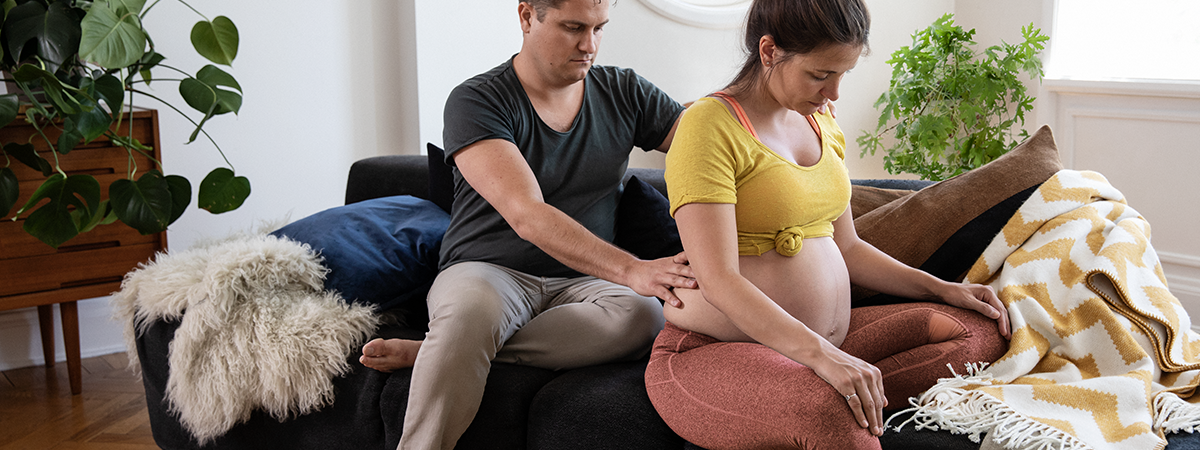Medications during pregnancy

Pregnant people can still get sick, and sometimes to the point of needing medicine. So it’s good to be aware that there are some over-the-counter medications that you should avoid. We’ll go through the most common ones here, as well as a good general mindset for medicine while pregnant, and what applies for natural medicines.
When you’re pregnant, it’s important that you always say so when talking to medical staff or buying over-the-counter drugs at a pharmacy. That’s because a lot of medicines can pass through to the placenta and affect the baby. Far from all are dangerous, and there are often alternative options that you can take while pregnant. When it comes to natural medicines, you should be a little extra cautious.
Pain relievers during pregnancy
You can get headaches, back pain, or joint pain whether or not you’re pregnant, but some people experience an uptick in these ailments during pregnancy. In that event, you can try a natural form of pain relief, like rest, a heated wheat cushion, or maybe a massage before opting for pain relievers. It’s best not to take medicine unnecessarily. But sometimes the alternatives just don’t help and you might occasionally have to take something for a headache, for example. It is important that you do not take pain relief medications that contain acetylsalicylic acid, which NSAIDs contain.
Paracetamol or ibuprofen – which is okay?
As for what kind of fever-reducing and pain-relieving medicine to take while pregnant, just remember to avoid not only painkillers containing acetylsalicylic acid, but also medicines containing the active substance ibuprofen, that is, medicines known as COX inhibitors (NSAIDs). This is because NSAIDs are harmful to the foetus. However, medicines with paracetamol as an active substance can be taken while pregnant. If you have a high fever, you can take this kind of fever reducer, but with a milder infection, it’s better to just rest until it passes. The best choice is to avoid painkillers or fever reducers as much as you can. If you need to use paracetamol-based medication for a longer period of time, consult a doctor.
If you’re trying to get pregnant, be aware that you should stop taking NSAIDs, since they can make it harder to get pregnant.
Medicine for stomach issues while pregnant
Just as it’s best to avoid taking medicine for headaches or fever, the same applies for stomach troubles. Rest often helps relieve stomach pain; you can try placing a nice heated wheat cushion on your tummy. Massage or a hot bath can also alleviate some kinds of stomach pain. If your belly is filled with gas, moving around can provide release. If the pain won’t let up, then you can consider taking pain relievers containing paracetamol as a last resort. If the issue is located higher up in your belly, if you’re having indigestion despite avoiding spicy or oily foods, coffee and tea, there are over-the-counter medications that you can take, even when pregnant.
For many people, nausea is an unavoidable part of the first trimester. There are several tricks and natural remedies you can try, and it may also be wise to talk to a midwife for some advice. If nothing is helping, you might need medicine. Over-the-counter medicines for car sickness and nausea are available at pharmacies –but ask for one that is okay to take while pregnant.
Don’t stop taking your regular medicine
As for medicine that you take regularly, for example for asthma, allergies, or depression, you should contact your doctor as soon as you realise you are pregnant. If you have asthma, it’s important to keep taking your medicine, but when it comes to certain allergy medications, some are more suitable than others during pregnancy – consult your doctor or midwife, or ask at your pharmacy if you haven’t had a chance to speak with your doctor yet. The same applies to drugs for depression or anxiety – if possible, your doctor will suggest an alternative if you are taking something that isn’t good to take while pregnant.
If you need a medicine that has no recommended alternative for pregnant people, then the pros and cons will be considered. Your doctor might decide to recommend that you keep taking the drug, because the risks of stopping are greater than any risks to the foetus.
In general: if you take a prescription drug, you should not abruptly stop taking it; consult your doctor first.
Antibiotics during pregnancy
Sometimes, you might end up with an infection that has to be treated with antibiotics. For example, you might get a sinus infection, a urinary tract infection, or an infected wound. Not all kinds of antibiotics are suitable during pregnancy, but many are. Tell your doctor that you’re pregnant so that they prescribe you an option that is suitable to take during pregnancy.
Natural medicines and vitamins during pregnancy
Be cautious with dietary supplements and natural medicines when you’re pregnant, and always talk to your midwife or doctor before you start taking anything. These products are not usually as well tested as regular medicines are. When you’re pregnant, you should be particularly cautious with natural medicines containing ginseng, calabash chalk and algae products. But if you don’t eat fish, you might need to take algae oil to get enough DHA fatty acid.
Of course, it’s important to get enough vitamins – and most of us do so through our diet – but if you take vitamin supplements, be careful not to overdose and be extra mindful of how much vitamin A you’re getting. More than 1 milligram of vitamin A per day is unnecessary in tablet form. We have gathered more info about which vitamins and minerals are important to get while pregnant, and what supplements might be necessary. An example is folic acid, which is good to start boosting before you even get pregnant.
Avoid unnecessary medications even while breastfeeding
The recommendations regarding medicines during pregnancy actually also apply while breastfeeding. Just like during pregnancy, it’s important to tell your doctor or pharmacist that you are breastfeeding if you need to take medicine. That’s because many medications and natural medicines are transferred to the baby through the mother’s milk.
Please note that all information above is based on Swedish recommendations.


